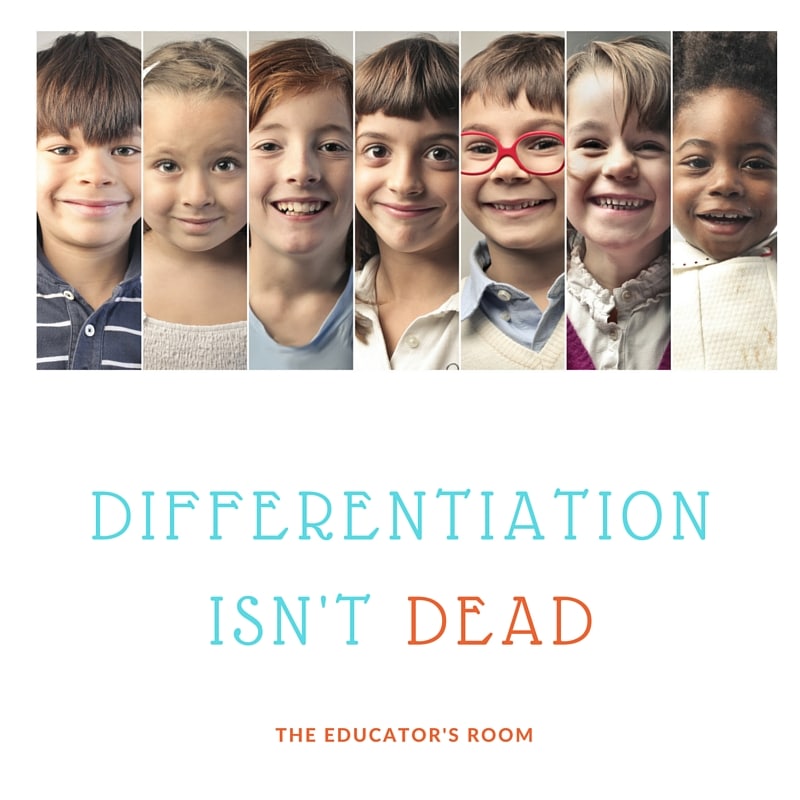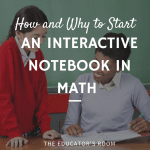Differentiation is the one word in education that make the most subdued educators scream out in pain. Principals use it in evaluations like it’s going out of style, and content specialists talk about it like it’s the best thing since sliced bread. Meanwhile, educators maintain intense fear when the word “differentiation” is uttered in conversation because they feel that the undertaking of it would be akin to biting off more than they can chew.
But, is differentiation really something to fear and cringe at, or can we learn to appreciate it as a valued part of our classrooms and even a way to save time?
[fusion_builder_container hundred_percent=”yes” overflow=”visible”][fusion_builder_row][fusion_builder_column type=”1_1″ background_position=”left top” background_color=”” border_size=”” border_color=”” border_style=”solid” spacing=”yes” background_image=”” background_repeat=”no-repeat” padding=”” margin_top=”0px” margin_bottom=”0px” class=”” id=”” animation_type=”” animation_speed=”0.3″ animation_direction=”left” hide_on_mobile=”no” center_content=”no” min_height=”none”][bctt tweet=”Is the word differentiation really something to fear and cringe at? ” username=”EducatorsRoom”]
Sometimes educators view differentiation as a process whereby we make instruction individualized for each student. What it really means is that we start by making goals for the whole group and then use what we know about students to break the same goals up into a few small groups differentiated for either the content, process, or product. Sometimes we differentiate for learning profile, sometimes for interest areas, and sometimes for skill level, and this usually requires working in pairs or small groups, but it doesn’t always mean students cannot work individually. You might think this means part of your class will stay off-task while you work with another group, but not necessarily!
So, what do you do about classroom management during the times you are working with small groups and how does differentiation help you?!
First, if students are given thoughtful directions so that everyone knows what they’re supposed to be doing at any given point, you can set aside moments of time in the class where students are not allowed to ask you questions. For instance, you might provide students with an anchor activity that everyone can accomplish and then tell them not to ask you anything for the first five minutes of the activity. This procedure allows you the time and freedom to move around the classroom, pass out materials, or check on the progress of small groups or individuals.
But, what about students who need help when each student is working on different tasks and you are working with one small group at a time? Here are some suggestions:
Here are some suggestions:
- Help students become better listeners. When we continually reinforce what we’ve said, they do not learn how to listen the first time directions are given. Tomlinson (2014) suggests teaching students the mnemonic RICE (Recall, Imagine, Check, Expert) for when they are totally lost on what to do next.
- Recall – try really hard to remember what the teacher said.
- Imagine – students close their eyes and try to imagine logically what the directions could have been for the task they’re working on.
- Check – if the first two steps aren’t working, students may ask (in a whisper) one of their classmates.
- Expert – assign certain reliable students to be the experts of the day, but students should only ask experts after exhausting all other resources.
- Organize efficiently. Students should have record-keeping document task and goal completion on as well as when they conference individually with you. This is a great way to hold students accountable while freeing up some of your time.
- Keep a running tab on the goals and competencies you want students to achieve. Make sure to check behind them occasionally. Their student folders should help show progress, but formal written assessments may also show this.
- Make sure students now what work to turn in and where to put it. Keep these places clearly labeled.
- Only grade what’s important. It saves you time and you can use this opportunity to talk to students about the value of doing work to meet their goals and grow on formal assessments.
- Make sure students know where their assigned seats are for when it’s time to begin or end class.
- Give students a clear expectation on how quickly you want them to move to their groups and start working. You may want to time them the first few times and suggest areas for improvement. Do not lower your standards (as long as they’re realistically achievable).
- Keep track of the time and give a warning when it’s almost time to end work. Come up with a signal for when students should move back to their assigned seats and expect them there in 30 seconds. Make sure they know you expect them to move quietly and quickly.
- Always expect the students’ best efforts and let them know you refuse to settle for less than their personal best. If they have a difficult time meeting expectations, coach them through it so that they can become more autonomous in the future.
[bctt tweet=”Differentiation Isn’t Dead! How NOT to cringe at the D-word! @embracespectrum” username=”EducatorsRoom”]
So, differentiation is not a dirty word and it’s not something you should fear at all. In fact, you can learn to love differentiation for what it provides your classroom–a way for all students to grow and increase efficiency in classroom procedures. If you fear differentiation, just do what I tell my son to do–take it one bite at a time. You don’t have to swallow the whole differentiation concept at once. Start by changing one thing at a time. Maybe you’ll start by using student learning profiles to differentiate or maybe you’ll start with skill level. Do what feels right to you, and eventually you’ll become the master differentiator!

Reference:
Tomlinson, C. A (2014). The differentiated classroom: Responding to the needs of all learners (2nd ed.) Alexandria, VA: Association for Supervision and Curriculum Development.[/fusion_builder_column][/fusion_builder_row][/fusion_builder_container]






